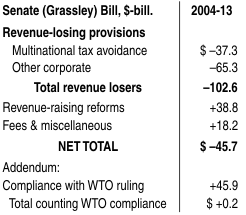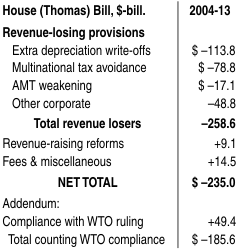October 14, 2003 03:59 PM | Permalink | ![]()
Click here to see this analysis in PDF format.
Pending in Congress this fall, with President Bush’s backing, are bills to provide the third major corporate tax reduction in the past two years.
“In light of the government’s dire budget straits, enacting still more tax cuts is irresponsible and reckless,” said Robert S. McIntyre, director of Citizens for Tax Justice. “Given the extraordinarily low level of corporate tax payments today, further corporate tax reductions are especially unwarranted. Instead, Congress should move in exactly the opposite direction, by closing loopholes and restoring corporate tax payments back up to a reasonable level.”
Corporate taxes have already been slashed—with no positive effect on jobs
In the just completed fiscal year, combined federal personal and corporate income taxes fell to only 8.4 percent of the economy, their lowest level since before World War II and a third lower than in fiscal 2000—with no relief in sight.
- Due in large part to the Bush tax cuts, personal income taxes have fallen to their lowest level as a share of the economy in more than 50 years.
- Corporate taxes have plummeted even more than personal taxes. In fact, at only 1.2 percent of the economy over the past two fiscal years, corporate taxes are at their lowest level since the 1930s, except for one year during Ronald Reagan’s first term.
- The most recent OECD data show that U.S. corporate taxes as a share of the economy are now virtually the lowest in the industrialized world.
Some of the corporate tax shortfall reflects the weak economy, but most of it stems in roughly equal parts from Bush’s big corporate tax cuts enacted in 2002 and 2003 and the huge amount of offshore tax sheltering that corporations now engage in.

- The 2002 and 2003 tax bills provided business tax breaks officially estimated to cost $177 billion in fiscal years 2002 through 2005, with $64 billion of that in fiscal 2004 alone.
- While the exact cost of offshore corporate tax sheltering is unknown, reasonable estimates peg the cost at upwards of $50 billion a year.
- Thus, recently created loopholes have slashed corporate tax payments by $100 billion or more annually—more than a 40 percent reduction since 2000.
- Counting tax breaks that have been on the books for longer, corporations now pay considerably less than half of what they should. They also pay far less than they used to pay. In fact, at 1.2 percent of the economy, corporate taxes are now three-fifths less than the 3.0 percent of the economy that corporate taxes averaged from 1950 through 2000.
Rather than address this egregious level of corporate tax avoidance, however, Congress and the President seem intent on preserving or expanding it.
The Senate corporate tax bill—missed opportunities, funny bookkeeping
In the Senate, Finance Committee Chairman Chuck Grassley (R-Iowa) has expressed deep outrage over the past year about rampant corporate tax sheltering, particularly offshore abuses. But Sen. Grassley doesn’t seem to understand that corporate tax avoidance is wrong not only because it’s underhanded, but also because it drains the Treasury of needed revenue and shifts the burden onto ordinary Americans.
- Sen. Grassley does include some useful curbs on corporate shelters in his bill. But those reforms would raise a total of only $39 billion over the next decade. At least that much in corporate loophole closing annually would be more serious.
- Even worse, Sen. Grassley proposes to use the revenue raised from his modest reforms to open even more corporate loopholes, at a ten-year cost of $103 billion, including $37 billion to facilitate offshore tax avoidance!

Sen. Grassley actually asserts that his bill is “revenue-neutral”—as if that were a reasonable goal of corporate tax reform—by taking credit for maintaining $18 billion in customs fees that everyone agrees will be extended anyway and by asserting that complying with a World Trade Organization ruling against a foolish U.S. corporate export subsidy ought to be counted as a $45 billion revenue-increasing offset, too.
“Senator Grassley’s approach of closing loopholes that ought to be closed, but then using the money to create new tax breaks is a lot like a bank forcing a would-be robber to put down his gun, but then giving him the money anyway so long as he asks nicely,” said McIntyre. “A triumph of form over substance, you might say.”
The House Bill—deep corporate tax cuts no matter the cost

Unfortunately, in the House, things are much worse. At the end of last July, Ways and Means Committee Chairman Bill Thomas (R-Calif.), with President Bush’s blessing, introduced a bill to provide companies with a staggering $259 billion in new loopholes over the next decade. Among the items on this corporate wish list are $79 billion worth of expanded tax shelters for multinational corporations.
Rep. Thomas doesn’t even give lip service to covering the enormous cost of his bill. He grudgingly offers a few minor reforms, but they raise a mere $9 billion over a decade. And like Sen. Grassley, he takes credit for extending existing customs fees and complying with the WTO ruling. But even if you mistakenly count those so-called offsets, Thomas’s bill still costs a net of $186 billion over ten years.
Click here for a table showing more details on the House and Senate corporate tax bills.



